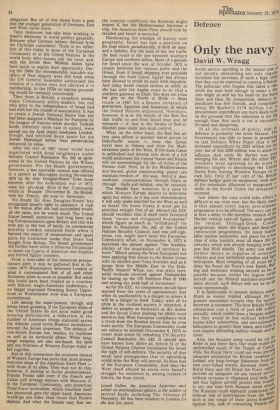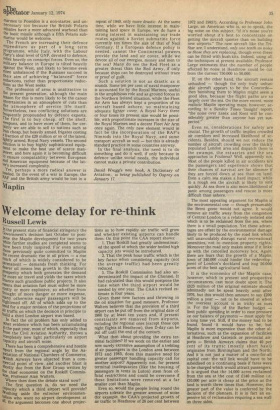Defence
Only the navy
David W. Wragg
Social service spending is the sacred cow of our society, demanding not only regular increases but increases of such a high order that they can be expected to outstrip inflation. The politician who forgets this takes a risk, while the man bold enough to make a few cuts might as well lay his head on the block there and then. By comparison, defence eg" penditure has few friends, and complaints about Mr Barber's £178 million cut in procurement expenditure are more likely to! on the grounds that the reduction is not big enough than that such a cut is excessive. ill-timed and dangerous.
Of all the reversals of policy, that on
I defence is probably the most blatant. en,Government was able to boast in presenting its last Defence White Paper that it bad increased expenditure by £523 million for the year, but of this E350 million was to allow for inflation. And while Mr Barber was ev,,ern swinging his axe, Britain and the other Er':' members were agreeing to do more Inci defence, largely to discourage the Unite States from leaving Western Europe to its own fate. Only 37 per cent of the British defence budget goes on equipment, with Innst of the remainder allocated to manpower while in the Soviet Union the situation i5 reversed. Just where the cuts could take effect difficult to say even now, but the likely resin` is that almost every major procurement programme is to be affected. The navy can see at best a delay in the maritime version of Harrier vertical take-off fighter, and possibu, the related Through-Deck Cruise; programme, while the frigate and destroYe' construction programmes, the latest huflter. killer nuclear submarine, and plans for a nevi class of mine hunters, must all share the un' certainty which was already hanging over thet new Sea Wolf missile. The army can exPecd further delays in supplies of armottre,t vehicles and new battlefield missiles and lig"„ helicopters. Most tempting of all must be II': delay the Royal Air Force's new Hawk, dog and Jetstream training aircraft as far 6-e possible because, unlike the Jaguar striX aircraft and the Nimrod maritime-reconnn.
i!' sance aircraft, such delays will not be so 0" vious operationally.
It is fashionable to present defence exPen. diture as money wasted, although the ar: gument sometimes accepts that the nuclei; deterrent is necessary. The four British Polarto submarines -cost a total of just £49 annually, which makes them a bargain indee",' but they would be lost without defendin: hunter-killer submarines, and anti-submarnt„ helicopters to protect their bases, and thesel;',. turn require defending surface vessels and air the Alas, the Russian army could be on, ,,e Rhine in just three days. Our trade routes a'r, undefended south of the Tropic of Canc.ecie while the Royal Navy could not even provt ' adequate protection for British trawlers Pur Iceland, nor keep foreign fishermen from own over-fished waters. Between them, t''ot Royal Navy and the Royal Air Force cann,.e provide an adequate air-sea rescue servtd without recourse to chartered civil help, a.",.,/ just four fighter aircraft protect this couln. at any one time from Russian aerial attac_r'd The Russians could approach undetected nn,t, without risk of interception from the We:s, such is the range of their latest bornbe'b. Against this, talk of converting Polaris su
Marines to Poseidon is a non-starter, and unnecessary too because the British Polaris missiles have a more advanced warhead than the basic missile although a fifth Polaris submarine would be welcome.
The French are increasing their defence expenditure as part of a long term Programme, while Italy, with the Labour Party's ideal level of GNP, devoted to defence, relies heavily on conscript forces. Even so, the Military balance in Europe is tilted heavily against the West, and likely to become even More unbalanced if the Russians succeed in their aim of achieving "balanced" force i.'cluctions, rather than proportionate reductions as the West seeks.
The profession of arms is unattractive to the present generation, although the main reason for this is more likely to be the career uncertainties in an atmosphere of cuts than the atmosphere of service life itself. Nevertheless, two conflicting solutions are frequently propounded by defence experts. The first is to buy cheap, off the shelf, weapons, and to have more of them, for certainly we are able to sell to nations such as
an cheap, but heavily armed, frigates costing a fraction of the £20 million or so of the latest, lightly armed, Royal Navy vessels. The second solution is to buy highly sophisticated equipment to make the best use of scarce manPower, and here again it is becoming difficult to ensure compatability between European and American equipment because of the later 's increased complexity. Yet, perhaps a more radical answer is needed. In the event of a war in Europe, the ILkF and the British army would be lost in a
repeat of 1940, only more drastic. At the same time, while we have little interest in maintaining land space in Europe, we do have a strong interest in maintaining our trade routes against a Soviet submarine force currently ten times the size of that of Nazi Germany. If a European defence policy is needed, cannot the Continental powers provide the land and air cover, while we devote all of our energies, money and men to the sea? Many do see the Red Fleet as a greater threat than the Red Army, if only because ships can be destroyed without trace or proof of guilt.
Such a solution is not as drastic as it sounds. Some ten per cent of naval manpower is accounted for by the Royal Marines, useful in the amphibious role and as ground forces in the Northern Ireland situation, while the Fleet Air Arm has always kept a proportion of its aircraft based ashore, so maintaining adequate fighter cover. A Royal Navy three or four times its present size would be possible, with proportionate increases in the size of the Royal Marines and a decent Fleet Air Arm once again. The only new element would in fact be the incorporation of the RAF's Nimrods into the Royal Navy, and some transport aircraft as well — but this is already standard practice in some countries anyway.
In the final analysis, the need is to do something and do it well, if only because in defence unlike social needs, the individual cannot make a private contribution.
David Wragg's new book, A Dictionary of Aviation„ is being published by Osprey on January 17.



































 Previous page
Previous page